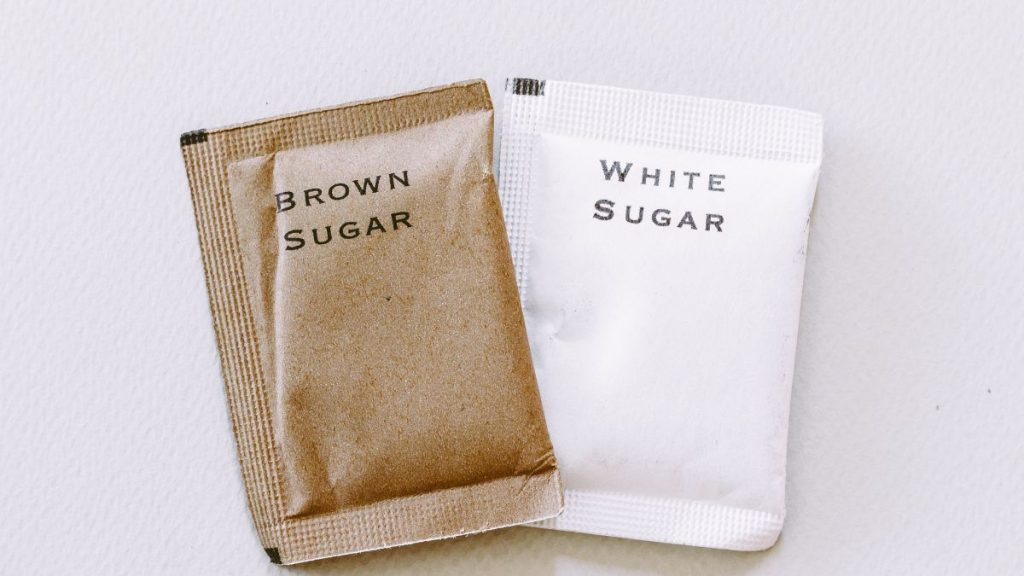South Africans consume an average of 38kg of sugar per person each year, and the debate over white sugar vs brown sugar keeps growing. Some claim brown sugar is healthier, while others stick with white sugar for its price and taste. But which is truly better for your health and budget in 2025?
What’s the Difference?
Both white and brown sugar come from sugarcane or sugar beets. The key difference lies in processing.
- White sugar is fully refined, removing all molasses and impurities.
- Brown sugar retains a small amount of molasses (around 3–7%), giving it a darker colour, moist texture, and caramel-like taste.
In the kitchen, that means brown sugar adds more depth to baked goods, while white sugar blends easily into tea, coffee, and everyday recipes.
Nutritional Comparison
When it comes to nutrition, the two sugars are almost identical. Both are pure sucrose, providing quick energy but no meaningful nutrients.
| Nutrient (per 100g) | White Sugar | Brown Sugar | Key Notes |
|---|---|---|---|
| Calories | 387 | 380 | Nearly identical; both lead to weight gain if overused. |
| Carbohydrates | 100g | 98g | Both cause similar blood sugar spikes. |
| Calcium | 1mg | 83mg | Brown has more due to molasses, but still negligible. |
| Iron | Trace | 0.7mg | Minimal; not a reliable source. |
| Potassium | Trace | 133mg | Too low to be beneficial. |
Even though brown sugar contains trace minerals like calcium, iron, and potassium, you’d need to eat over a kilogram a day to gain any real nutritional benefit.
Health Impact: What Experts Say
Experts from the World Health Organization (WHO), American Heart Association (AHA), and USDA agree that the differences are minimal. Both are considered added sugars, meaning they contribute calories without nutrition.
Overconsumption of either type can lead to:
- Weight gain and obesity
- Type 2 diabetes and insulin spikes
- Tooth decay
- Fatty liver disease
The WHO recommends limiting added sugars to less than 10% of daily calories (about 50g for a 2,000-calorie diet). That’s roughly 12 teaspoons of sugar a day from all sources combined.
So while brown sugar might look natural, it’s no healthier than white sugar when it comes to your body’s response.
Affordability in South Africa (October 2025)
South Africa remains one of the world’s largest sugar producers, with sugarcane farms concentrated in KwaZulu-Natal. Despite global price fluctuations and sugar tax increases, local sugar prices remain relatively stable.
| Type | Common Pack Size | Price (ZAR) | Price per kg (ZAR) | Notes |
|---|---|---|---|---|
| White Sugar | 2.5kg | R45 | R18 | Standard refined sugar; Shoprite offers R44.99 promos. |
| Brown Sugar | 2.5kg | R48–R55 | R19–22 | Slightly higher due to added molasses. |
While brown sugar is often priced higher, the difference is small, usually R1 to R4 per kilogram. White sugar still wins on affordability, especially when bought in bulk (5kg packs).
Retail chains like Shoprite, Checkers, and Pick n Pay offer regular specials, keeping household sugar under R1 per teaspoon even with inflation and the sugar tax.
Verdict: Health vs Budget
- Health: Brown sugar has trace minerals but no significant health advantage. Both raise blood glucose quickly and should be limited.
- Affordability: White sugar is cheaper and easier to find in bulk.
- Taste and Texture: Brown sugar adds flavour and softness to baked goods.
For a balanced lifestyle, the best choice isn’t about colour, it’s about quantity. Reducing total sugar intake is more beneficial than switching types.
Better Alternatives to Try
If you’re looking for natural sweetness without the health risks, try:
- Honey – adds nutrients and antioxidants.
- Dates or bananas – whole-food options with fibre.
- Stevia or xylitol – low-calorie sweeteners suitable for diabetics.
For example, sweetening your rooibos tea with a teaspoon of honey provides flavour and mild health benefits without the heavy sugar load.
Check also: 10 Warning Signs of Diabetes You Should Never Ignore
When comparing white sugar vs brown sugar, the verdict is clear:
- Brown sugar is slightly richer in flavour.
- White sugar is the more affordable choice.
- Health-wise, neither is significantly better. Moderation matters most.
Choose based on your taste and budget, not the colour. For long-term health, focus on reducing added sugars altogether.










